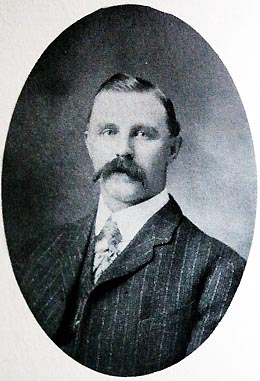Russ Lambert was one of Sumas's (Whatcom County) most influential pioneers. An attorney, he incorporated the town in 1891, and helped form its town government. He later represented Sumas in both houses of the state legislature, where he was a colorful, authoritative presence. But he is especially remembered for his participation in the 1897 discovery of gold north of Mt. Baker that set off the great Mt. Baker Gold Rush.
Early Years
Russ Stephen Lambert was born September 16, 1867, in Belvidere, Illinois, the son of John C. Lambert and Cassie Hale Lambert. He grew up on the family farm, then attained his law degree in 1889 at Wesleyan University in Bloomington, Illinois. After practicing law in Illinois for a year, he moved west and opened a law office in Sumas in December 1890.
One of Lambert's first acts as a Sumas attorney was to incorporate the new town, which took place on June 18, 1891. He then returned to Illinois and married his fiancée, Carrie Swail (1870-1918), on July 23. Together they returned to Sumas, and Carrie Lambert later wrote what they saw upon their arrival on August 21, 1891:
"The boom which had struck the town was subsiding somewhat and there were quite a number of empty store buildings and hotels ... . What struck me most forcibly was the lack of paint on the buildings and the stumps in the streets. There were no sidewalks, the chief boulevard being the S&I railroad track, so we walked down this avenue in search of a place to live, until we might build a home" (Lambert).
The Lamberts did indeed build a home, on Johnson Creek in Sumas. Carrie Lambert writes that they moved into it in November 1891. (The house survives today [2011] and until recently operated as a bed and breakfast.) Once the Lamberts settled into their new home, children soon followed: Louise (1892-?), Sidney (1894-1995), Esther (1897-1934), and John (1908-1971).
Gold in the Mountains
Lambert plugged away at his law practice, but was intrigued by reports of gold in the mountains east of Sumas. It didn't take him long to try his hand at prospecting. He befriended Sumas resident Jack Post (1860-1941) and by 1893 they were occasionally prospecting together. In 1896 Lambert took a hiatus from his law practice and began prospecting full time with Post. The two were joined about this time by Lyman G. Van Valkenburg (1862-1922), known as "Van."
Their efforts paid off. On August 23, 1897, the three men were prospecting north of Mt. Baker when Post discovered gold on Bear Mountain, setting off a furious gold rush into the region that author P. R. Jeffcott describes as "Whatcom County's greatest excitement she has ever known"(Chechaco and Sourdough, p. 81). The Lone Jack Mine (named after Post) operated until 1924, and yielded half a million dollars in gold ($6.5 million in 2011 dollars). Though it wasn't the biggest gold strike in the Mt. Baker region, it was probably the most well-known.
Lambert, a confident man with a fondness for cigars and an enormous walrus mustache in his prime, was an avid storyteller. One of his favorite tales from his prospecting days was a misadventure he had while returning to Sumas via British Columbia (the mines were only a few miles south of the Canadian border), unshaven, unkempt, and packing a pistol. He stopped at a restaurant in Chilliwack, B.C., and before long thought he noticed that the other customers were all leaving. Soon he found out why: They thought he was a train robber. He was detained by the Royal Canadian Mounted Police, and it took him a few hours of fast talking to convince the Mounties that he was legit.
Politics and Community
Lambert became more politically active as the turn of the twentieth century approached. A staunch Republican, he was Sumas's mayor at various times between 1895 and 1910, and served as supervisor of the Washington Forest Reserve from 1900 until 1904. He also served in Washington state's House of Representatives in the 1899, 1905, 1907, and 1909 sessions, and was a powerful, occasionally flamboyant presence, with a taste for political jousting. He was elected to the state Senate in 1920, where one of his signature achievements was securing passage of a law that prohibited making a substitute for butter. Lambert was a well-known and well-respected man, and many were surprised when he was upset in the 1924 Republican primary for re-election.
He was also actively involved in many of the social organizations of the day, and had a keen interest in the Sumas community. "Russ Lambert, the attorney, always had his ear to the ground," explains Roy Franklin Jones in his book, Boundary Town. Lambert was a Mason, held all of the officer positions in Sumas's Odd Fellow's club, and was a member of Bellingham's Elks club. He also served as school director for Sumas's school district, and as vice president and president of Garrison State Bank.
Lambert continued practicing law in Sumas until declining health forced him to retire in the autumn of 1943. He lingered until March 25, 1944, physically weak and unable to live alone during his final months, but mentally alert until his passing. His funeral was held three days later, and all of Sumas's businesses closed during the hour of the service in a final salute to one of the town's most memorable pioneers.

